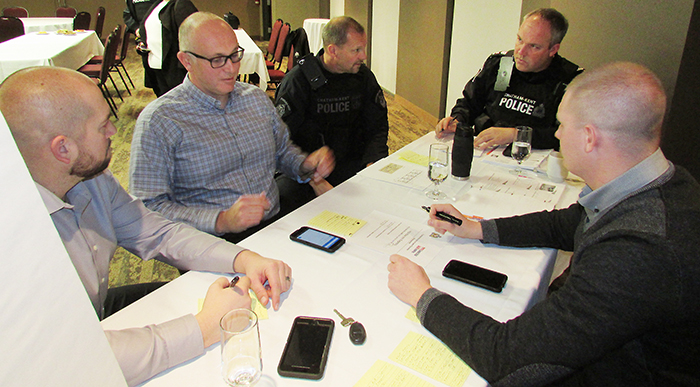
From left, Const. Kevin Burgess, Sgt. Mike Stokes, Sgt. Paul Pomajba, Sgt. Jason Chickowski and Const. Trevor Biskey work on a mock crisis negotiation during recent training at the John D. Bradley Centre.
Stay calm, and develop a strong rapport. Those are important words to live by as a police crisis negotiator.
Chatham-Kent and Niagara Regional police officers, along with staff from the Canadian Mental Health Association took part last week in a crisis negotiators course in Chatham.
Tom Hart, of Canadian Critical Incident Inc. (CCII), put on the course. For two decades, he served as a crisis negotiator with the Durham Regional Police. He said it is all about how to communicate and negotiate.
In many cases, when officers are faced with a crisis situation, it’s due to mental health issues.
“You have to recognize the illness and develop a negotiation strategy,” he said. “The whole focus is a peaceful resolution. It could be two hours or two days (of negotiations).”
Primarily, such crises occur in the form of an escalated domestic dispute, Hart added.
“It could also be brought on by drugs, alcohol or poor coping skills,” he said. “Regardless, the focus is to resolve the crisis, stabilize the person and get them treatment. Listening and de-escalating is crucial.”
Hart said a sign of progress in such negotiations is developing a rapport with the person, and that begins with an accurate assessment of what is troubling them.
“You can then build on that rapport and then can help influence that person,” he said.
Patience and tolerance are must-haves.
Participating officers said it is crucial training, as frontline officers are negotiating on a daily basis.
Const. Fraser Curtis with the CKPS took part in the course for recertification purposes. He’s been a crisis negotiator for the past seven years.
“This training is very valuable. It’s something that’s needed on the road,” he said. “There are times when a call comes in and a crisis negotiator is the primary contact. You work to de-escalate and have a positive outcome.”
Sgt. Albert Pilbeam of CKPS said there is “tremendous value” in crisis training.
“In any hostage environment, negotiation has to be at the forefront,” he said. “It’s something that happens with a high degree of regularity.”
Pilbeam added officers must be aware of the various mental illnesses from which a person could suffer.
Sarah Faubert, who works with the CMHA, said taking the course offered her the chance to learn a new perspective. She is part of the CMHA’s crisis team.
“It’s important to have knowledge of mental illnesses and have validation techniques to de-escalate,” she said of police officers. “We (CMHA) might know the historic diagnosis and any resources there are in the community to help an individual. The officers have a different set of skills than the CMHA. But we can integrate these skill sets.”
When media caught up to course participants on Nov. 22, they were involved in mock hostage negotiations. Hart had set up scenarios where actors were holed up in rooms at the nearby Holiday Inn Express, and teams of negotiators had to work to de-escalate the situations.
The teams were comprised of five officers – an incident commander who had oversight of the situation, a tactical commander who offered advice on force options should the negotiations falter, and three officers involved in direct negotiations with the person in crisis.
“We make it challenging, but realistic,” Hart said of the scenarios.
Curtis said the scenarios offer the closest thing to an actual situation and trump anything taught in a classroom setting.
He added that an officer has to learn to remain calm no matter what is thrown at him or her.
“It can be stressful. Keeping a level head is pretty important,” he said.






